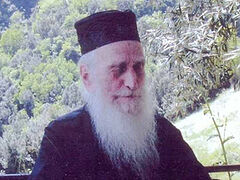Igumen Cyprian (Parts) from Moscow’s Sretensky Monastery answers questions about father-confessors, the proper relationship with them, and salvation.
—Father Cyprian, can you please explain what a father-confessor is? Is he the priest you confess your sins to?
—Of course, first and foremost we are talking about a priest who is allowed to listen to confessions. Any parish priest can be a father-confessor.
—What should be observed here? Are you supposed to trust this priest?
—There certainly must be trust, without which relations with your father-confessor are impossible. When choosing a father-confessor you should take into account what the Holy Hierarch Ignatius (Brianchaninov) said: “A father-confessor should be man of the Church.” He says that your heart should belong only to the Lord and in no case to your father-confessor. And there is another important criterion for choosing a priest who can be your father-confessor: He must guide you to Christ, and not to himself.
Archimandrite John (Krestiankin) made another very important observation. He said that neither a father-confessor should replace the will of his spiritual child with his own will, nor should his spiritual child should try to subordinate his father-confessor’s will to himself. Otherwise, according to Father John, it will be an obsession.
A father-confessor is a priest to whom you go for confession. He guides you in the right direction. And it’s up to you whether to walk in this direction or not. After all, if someone who has a brilliant father-confessor himself doesn’t move, what will happen? It’s like signpost on a road that points you in the right direction. If you don’t go anywhere, you will just stand there and rot at the signpost. Your father-confessor is the very “signpost” that shows this direction. But “whoever walks along the path will get where he’s going”, as the Russian saying goes.
—If you live in the world [not in a monastery], is one hundred percent obedience to your father-confessor required?
—No. St. Ignatius says that one hundred percent obedience is possible only when you live with a spiritual elder, because the elder’s will is Divinely enlightened. Everything is according to the will of God for him, and with divine enlightenment will he piously mortifies the will of his spiritual child.
But we are not given such a life. As St. Ignatius said, we can live by counsel. It is necessary to seek counsel—a father-confessor should look together with the person who comes to him for the way to act, according to the will of God.
—What is the layperson on his part supposed to do in order to seek the will of God?
—A layperson should read the Holy Scriptures and try to live according to the Word of God and the Church Typicon. He and his father-confessor should look together for how to act according to the will of God. Therefore, you should not regard your father-confessor as an oracle, who like a computer gives only correct decisions. And the person who asks must be ready to accept the will of God.
Schema-Archimandrite John (Maslov; 1932–1991), an elder of the Holy Trinity-St. Sergius Lavra, used to say, “Someone asks for my advice, I pray, but Heaven is silent. This happens because that person is stuck to his own will like a magnet to a piece of iron. And in such cases, I can only say, ‘Pray’.”
You see, this was a man possessed the spiritual gifts of clairvoyance and discernment. And what is the gift of discernment? This is a gift of grace and knowledge concerning how you should act according to the will of God in any situation and at any time. But when someone came to him for advice but was not ready to accept the will of God, even a man like Schema-Archimandrite John could say nothing. So, you yourself must make efforts.
It is good if a Christian has a father-confessor whom he can consult about his life. But before choosing a father-confessor, you need to think it over carefully. A person should take a closer look and get help in the form of advice.
But no gain without pain. A layperson should trust this priest; but, again, the priest should guide him to the Lord, to Christ, and not to himself. And he should not completely replace the will of his spiritual child with his own. You must seek the will of God yourself in order to act according to the commandments of God and the Gospel in your life, and you yourself have to work. After all, it happens that a priest may say something to one person who comes to him for confession, but to another says nothing, although the latter also comes to confession and repents. Both come to confession; however, one can receive advice, but the priest does not know what to say to the other. This means that a person must make an effort himself.
 One day a young man came to elder Pavel (Gruzdev; 1910–1996) with an internal question: “How can I learn to pray?” Fr. Pavel asked him:
One day a young man came to elder Pavel (Gruzdev; 1910–1996) with an internal question: “How can I learn to pray?” Fr. Pavel asked him:
“Do you want to learn how to pray?
“Yes, I do,” the young man replied.
“Come with me,” the elder said, and took him to the exit, to the gate at the church courtyard.
Then he asked him:
“Can you see the road?”
“Yes, I can see it.”
“So, go,” Fr. Pavel said.
At first the young man did not understand. “What is this? I came to the elder, and it appears that he has sent me off.” But his friend explained to him later: “He put you on the road.” Fr. Pavel showed him: “I cannot walk your path for you. You have to walk this path yourself.”
—Suppose that for some reason you cannot find a father-confessor, but you want to improve inwardly and change. What should you do?
—Did St. Mary of Egypt have a father-confessor? No, she didn’t. Did she die spiritually because of this? No. She was in a desert, where there were no priests. And the Lord Himself enlightened her. After all, she was there on obedience—she received a revelation from the Mother of God, Who said to her, “Cross the Jordan, and you will find true peace.” It means that she lived in obedience all this time, and therefore the Lord helped her and instructed her. But what is dangerous is when there are priests, but you say, “No, I will work on my salvation by myself.”
It’s not about finding a person who will pick you up in his arms and carry you to the Heavenly Kingdom or take you by the hand and drag you there. No. You will have to walk this path yourself. But it is dangerous to remain without counsel. If we live according to our own will, we won’t find a father-confessor. The problem may lie in the person himself—he wants everything to go according to his own will and wants the priest to bless his decisions. No, it doesn’t happen that way. The person wants find a priest who will bless his decisions, pray for him, and then everything will go as he plans. It doesn’t work that way!
One day a pilgrim came to a desert monastery and asked the abbot, “Do you have miracles here?” The abbot answered him: “In the world, you think it’s a miracle when God fulfils man’s will. But we believe it’s a miracle when man fulfils God’s will.”
—Please tell us a little about God’s commandment, that people shouldn’t make idols out of their fathers-confessor. This is common, especially among women.
—People should always put the Lord first. Then there will be no idols in the human heart. If you put a human being first in your heart—even if a very good one, even if a father-confessor—then he becomes your idol. And this is an obsession. Apostle John the Evangelist said: Little children, keep yourselves from idols (1 Jn. 5:21). God is jealous (Nah. 1:2). Do ye think that the scripture saith in vain, The spirit that dwelleth in us lusteth to envy? (Jas. 4:5).
A person should only put the Lord first. You must walk towards this through repentance. Repentance is a life’s work—not just mentioning your sins at confession, although of course it is necessary to reveal your sins in the sacrament of repentance. Unless you work at self-improvement and strive to live according to the Gospel commandments, where will this repentance be put into practice?
—Father Cyprian, do people living in the world have a chance to be saved without going to a monastery?
—Yes, they certainly have. Do people attain salvation in the world? Yes, they do.
—How do we know that is true?
—You know, Fr. John (Krestiankin) gave an answer to this question. He once remarked that until the end of time, people would be saved in both monasteries and in married life. Fr. John knew what he was saying.
—Did he provide only two alternatives?
—No. He talked to his cell-attendant Tatiana Sergeyevna Smirnova (1941–2019) about three choices: “black”, “white”, and “gray”. “Black” is the monastery, “white” is marriage, and “gray” is the way she lived.
 Archimandrite John (Krestiankin) and his cell-attendant Tatiana Smirnova
Archimandrite John (Krestiankin) and his cell-attendant Tatiana Smirnova
—But she carried out her obedience with the elder…
—Yes. But do you think it was easy for her? Read how she described her life with Father John. Your life must be on a level appropriate to living near such an elder. It’s binding on you. At times she wanted to run away, and she wrote honestly about these moments. But she stayed. It wasn’t easy for her at all. Her path was not rosy. She had to walk with Fr. John, but she had walk on her own, on her own two feet. By the way, if you want to see an exemplary relationship between a priest and his spiritual child, I recommend her book, Notes of an Elder’s Clerk.
I should also mention the following words of Fr. John: “In our day, the most important thing for pastors and their flocks is the awareness of their own weakness.






